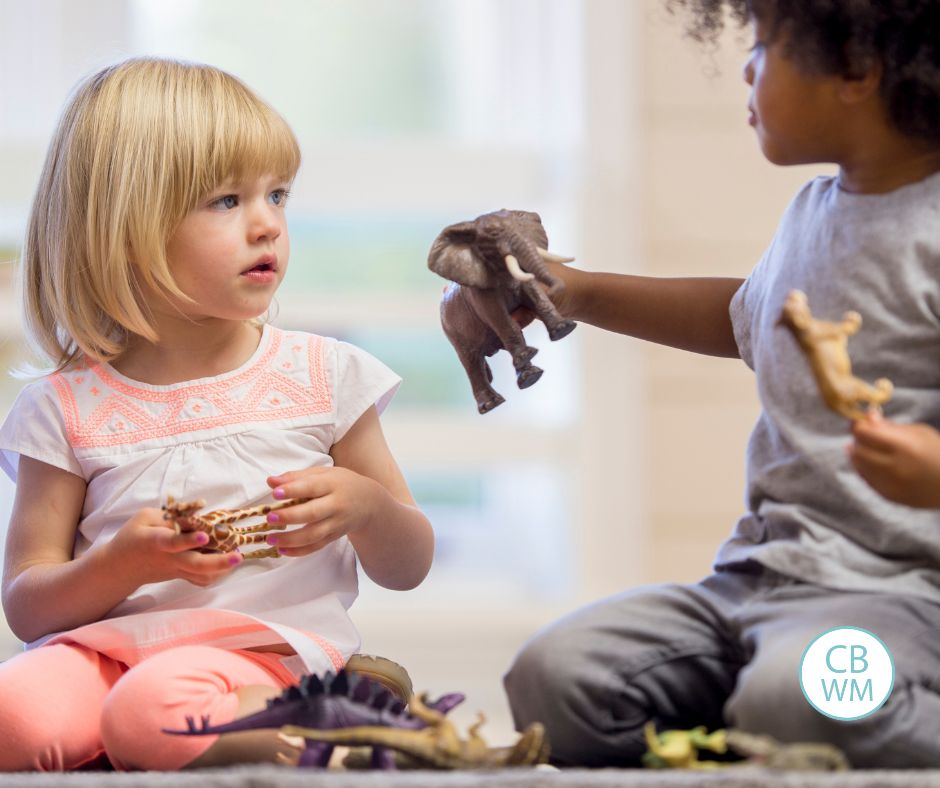Sharing is a skill that needs to be taught and developed. Here are 15 tips to help you teach your child how to share and eventually help them to want to share.

Sharing is a hot topic for little ones. We want our children to be kind and willing to share with others, but they typically are not interested. The wild thing is that initially, older babies and young pretoddlers are fine with sharing. But a point comes when they are suddenly not okay with it anymore.
Sharing is indeed an important skill to learn in life. Sharing helps set your child up to be able to make friends (and keep them), deal with disappointment, how to take turns, and how to play cooperatively.
Most kids need to be taught how to share, so do not be overly concerned if your little one has trouble sharing. Here are some tips to help your child learn to share.
Post Contents
- Accept Selfishness as Part of the Process
- Remember Actions Precede Beliefs
- Practice in Non-Conflict Times
- Practice With Parents
- Do Not Allow Younger Siblings to Rule
- Do Not Allow Older Siblings to Rule
- Stay Nearby
- Sing Songs
- Use a Timer
- Do Not Reward Ungracious Behavior
- Safeguard Favorites
- Talk About Good Feelings
- Discuss Empathy
- Praise for Sharing
- Allow Your Child to Give Up the Item
- Point Out Your Sharing
- Give it Time. A Lot of It.
- Related Posts
Accept Selfishness as Part of the Process
There I was. I was sitting watching my cute little 18 month old son play with a new friend. I was so proud of him. This little boy of mine was so sweet and obedient. He had never even had a hard time sharing! He didn’t mind it at all.
Then it happened.
Brayden refused to share.
I was mortified! How could my sweet boy whom I spent so much time with, working to help him be a great citizen, just not share?
My brother-in-law’s father was there, and he said something I have never forgotten.
He said in order to really share, the child has to first feel possessive over an object. What wisdom! Your toddler isn’t really sharing until he feels possessiveness over objects, and that doesn’t usually happen until somewhere around 18 months.
The concept of sharing doesn’t become an issue until sometime around 18 months old. You will probably start to see some “I do it myself!” statements around the same time as sharing becomes difficult.
Children who have older siblings or are around children often will likely be possessive earlier than 18 months. Children learn to defend their property if they want to keep it.
So, the moral here is do not feel like a failure of a parent when your sweet one refuses to share all of a sudden. Just think, “Great! Now the real learning can begin.”
Remember Actions Precede Beliefs
A lot of times, parents don’t want to require their child to share. They want the child to choose to share; they believe this will make the sharing more meaningful.
Remember that actions precede beliefs.
We have to practice principles before we can believe in them. Practicing sharing will help your child learn to share. It will show your child that sharing and turn-taking isn’t the end of the world, life goes on, and maybe even that sharing can make you feel good inside.
A two year old won’t really understand WHY they are sharing, but they can understand that they are expected to share. This will lead to a four year old and older being a person who is willing to share for the right reasons.
You can model sharing in many avenues. You can do it at home playing with each other, you can point it out when you share with neighbors or your spouse. You can even make treats and take them to share with other people in the neighborhood.
>>>Read: Teaching Kids to Be Moral Before They Understand Why
Practice in Non-Conflict Times
You will always have more success in training your child if you teach your child the concept when it isn’t in the heat of the moment. When you are at home, practice sharing. Have your child share with you or an older sibling (if the older sibling is able to knowingly help teach the concept).
Talk about how you share, how you take turns, and that it is nice to share. Practice sharing and taking turns. Talk about how happy you feel when your child shares with you and how happy your child must feel for being kind. Give lots of encouragement when your child chooses to share. Do this even if it is begrudgingly at first.
>>>Read: Training in Times of Non-Conflict
Practice With Parents
As parents, we need to model positive behavior. Do not allow your two year old to grab whatever she wants from you when she is playing with you. Sure, you don’t mind, and sure, she is a kid, but how do you insist on certain manners with friends when you don’t with yourself?
Your child will benefit from practicing sharing even with it is with a person who doesn’t care about what is being shared. Make sharing a part of everyday life so that it is more natural when with a playmate.
When your child shares with you, thank your child and tell her how happy you are that she is sharing. “Thank you! That is so nice of you to share your truck with me. That makes me feel so happy inside! I bet you feel happy inside, too!”
Positive reinforcement is really powerful and will bring a lot of gratification to your child.
Another thing you can do to help teach about taking turns is to play games together. Follow the rules and take turns to help your child learn and practice the skill.
>>>Read: Best Educational Games for Toddlers and Preschoolers!
Do Not Allow Younger Siblings to Rule
We really don’t like to hear little tantrums. No one likes it. Do not allow your youngest child to roam the house screaming for things and getting it immediately.
Exhausted parents often sigh, “Can you please just give it to her?” That does not teach your little one to wait her turn to share. It teaches her to throw a fit in order to get what she wants.
My two oldest actually have had to be coached into not giving in to Brinley screaming for things. She would scream, and they would respond the way she wanted them to. I had to teach them that it is okay for them to say no to her when she is screaming.
A screaming and tantruming two-year-old is not fun, but it is necessary to help them learn patience and how to share.
Do Not Allow Older Siblings to Rule
Conversely, do not allow the older siblings to dictate what is played with by whom. When Kaitlyn was almost 1 and Brayden was almost 3, I would allow him to take the toy she was playing with so long as he gave her something else to play with. She didn’t mind at all. That seemed easy.
The problem is, babies get older and get possessive! Another problem is that peers won’t go along with things like a little sister will. Instead, teach the older child that the baby has that toy and he can have it when her turn is over.
So don’t let your preschoolers and older children be the overlord who decides who gets to share and when turns are over. We don’t want selective sharing. Even if our older kids seem to be pretty good at sharing, we want to establish smart habits that will serve them well outside of the home with other social interactions.
Stay Nearby
When a child is working on learning how to share, stay nearby when interactions are happening. That way you can jump in and help guide situations if needed. You can also offer praise when good choices are made.
While you want to stay nearby, you want to give the children time to work things out. You have to use your best judgment to decide when to step in. Give them time to work it out until it seems like it is time to be a referee.
Sing Songs
I love the Daniel Tiger episode on sharing. You can go to PBS and scroll down to episode 110. There is a catchy song. When Brinley had a hard time sharing, I would sing, “You can take a turn, and then I’ll get it back!” She shared 100% of the time after I sang that song.
Use a Timer
A timer is a great way to help children know their turn is coming. Use an amount of time that is short enough for children to be patient but long enough that the child playing with the item actually gets to play with it.
The timer is a wonderful tool to use in early childhood. It is so helpful in many areas. Read more here: 10 Uses For a Timer That Will Make Parenting Easier
Do Not Reward Ungracious Behavior
For me, the child whose turn it is doesn’t start timing the “turn” if the child waiting for the turn is following the other child around and screaming, crying, or otherwise harassing the child about wanting the item. The turn doesn’t count unless the other person is able to enjoy the turn.
If the child waiting for a turn is having a fit and in tears, wait to start the timer when they are able to calm down.
Safeguard Favorites
If your child has something that is hard for him to share, I think it is wise to put that item out of sight when a friend comes over. You also do not want to not take that item to playdates. If you take a toy to a playdate or the playground and the other kids can’t touch it, you are setting them up to squabble.
Ideally, I think you work on being willing to share everything, but we need to do take small steps with children. Forcing sharing favorite items can create a big scene you will need to discipline over.
Work on sharing other things first and help your child recognize the benefits of sharing. Another thing, some children tend to destroy items. There is no reason to force your child to hand over special toys or a prized possession just to be destroyed.
As sharing is practiced, the day will come when your child will be able to share all things (within reason, I am sure there will be things that are not something that gets played with by everyone).
It can be a good idea to have a friend coming over to bring some toys to share, also. Both children will be more willing to share when they have to share their own toys AND have toys they want to play with that are not their own. It helps them see both sides of the situation better.
Talk About Good Feelings
When your child shares, point out how happy it made that other person. “Look how excited she is to play with that puzzle! Doesn’t that make you feel happy inside that you helped her feel so happy?”
When someone shares with your child, point out how nice that was and talk about how it made him feel. Take the time to help your child make the positive connection.
Help them recognize that generosity leads to positive feelings. Help set them up to have a good interaction and give your child opportunities to share.
Discuss Empathy
Talk with your child about how she feels when someone doesn’t share with her. Does she feel sad when her friend or sister doesn’t share with her? How does she think it makes her friend or sister feel when she doesn’t share? Empathy isn’t necessarily a natural thing for people, and children will benefit from you talking about it.
Point out that if she feels sad and it hurts her own feelings when others do not share, then her friends feel sad, too, when she will not share with them.
Praise for Sharing
“Thank you for sharing that toy! That was very nice of you.” “Wow! Thank you for sharing! That shows your sister that you love her.” Reinforce that praise with a hug, kiss, or rub of the back. Let your child know that choosing to share was the right choice.
Allow Your Child to Give Up the Item
It will be true sharing if your child actually hands over the item rather than you taking it from your child. Give your child some time to give it up. There is a point you will have to remove it if the child won’t give it up, but give your child a fair chance before going there. You need to have patience as you teach this skill.
Point Out Your Sharing
As adults, we usually call our “sharing” borrowing. When you borrow something or lend something out, find a way to talk about it with your child. Show your child that grown-ups share, too. Talk about how you feel when your friend shares with you or how you feel when you share with your friend. This allows you to be a good example and demonstrate positive behavior.
Give it Time. A Lot of It.
It will take time and practice for your child to share. Be patient in the process. When you are going to have a friend over or when you are going to a playdate, remind your child about sharing and talk about why it is nice and how to share (this is the Ask and Tell principle).
Your child won’t be a master sharer overnight. Give it time and practice. Be patient with your child while he learns to share. Some children are naturally more possessive than others. Every person has natural strengths an weaknesses. There will be things your child is more natural at doing. Practice makes perfect!
Related Posts
- How to Get Your Child to Obey with a Simple “Yes Mommy”
- How to Deal with Toddler Tantrums
- Getting Children to Obey the First Time
- Distraction as a Discipline Tool

This post first appeared on this blog in February 2015

